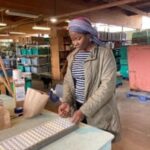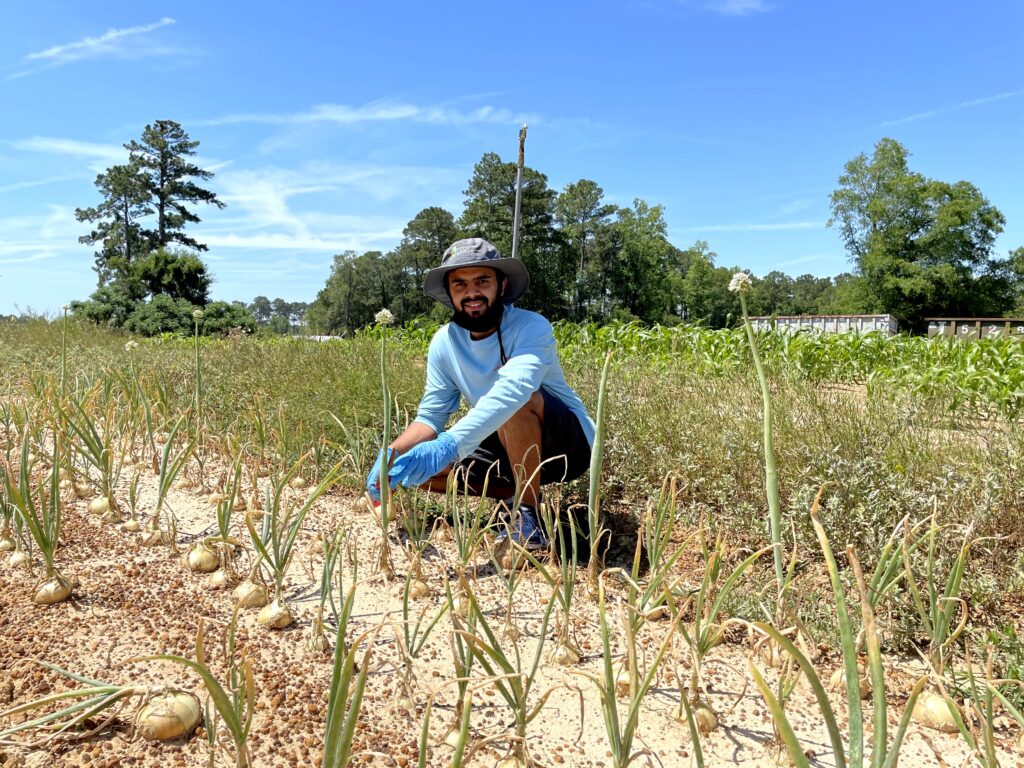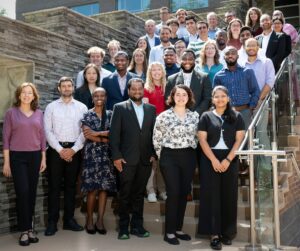The FFAR Fellows Program

Aicha Waziri, Washington State University.
The College of Agriculture and Life Sciences at North Carolina State University and the Foundation for Food and Agriculture Research (FFAR) created the FFAR Fellows Program to provide professional development and career guidance to the next generation of food and agriculture scientists across FFAR’s challenge areas and strategic initiatives.
The consensus among employers is that U.S. universities could better prepare a career-ready STEM workforce by breaching disciplinary silos and increasing the focus on professional development and “soft-skills.” This approach cultivates a more well-rounded graduate ready to collaborate and contribute to multidisciplinary teams.
By providing early career support to graduate students, the FFAR Fellows program cultivates supportive relationships between graduate students and industry, government, and NGO peers to equip students with the skills needed to facilitate their transition to the workforce and prepare future leaders for food and agriculture. Fellows are mentored over the 3-year program by university and industry representatives and engage with their peers in professional development programming both virtually and at four in-person sessions. This comprehensive approach to training, mentoring, and networking transforms Fellows into skilled practitioners in collaboration and team science, adept at navigating the complexities of multidisciplinary environments.
Cohorts of ~30 Fellows train together and support each others as they continue through their respective graduate programs. Two hundred fellows from 45 universities across the U.S. and Canada have participated in eight cohorts. Recruitment for the ninth cohort begins November 1, 2025.
Each Fellow is supported by an industry or analogous sponsor, which funds half of the student’s expenses related to the fellowship’s professional development programming. Students can also apply for one of five scholarships funded by the Foundation for Food and Agriculture’s Rockey FFAR Fellows Fund. For eight Stipend Fellows, sponsors also fund half of the student’s stipend, fees, tuition, and related costs. The remaining half of these funds are matched by the Foundation for Food and Agriculture Research.
I don’t even know where to start to share how much I valued and enjoyed our first training week in Raleigh. A week later, the assessments, communication training, and coaching have already been useful in navigating personal and professional conflicts, and I know I will continue to employ them. The site visits and panels gave me a great introduction to opportunities in industry – I previously had limited experience with this area. The pacing was really thoughtful – packing in as much as possible while still allowing time to rest and get to know the other cohort members. I was struck by the enthusiasm, kindness, and sincerity of everyone in the group. I was nervous about meeting so many new people, but that evaporated almost instantly. I found our time challenging, motivating, fun, and useful all at once, and I am really grateful to be a part of it.
The FFAR Fellows program has connected me to a network of outstanding peers interested in leveraging agricultural research for change. With the community and professional development skills I’ve gained, I know I’ll leave this program with the skills to succeed [in my future career].
The FFAR Fellows program made me a better researcher, communicator, public policy advocate, and as a whole, a better human being. It introduced me to inspiring mentors, innovative tools and strategies, and a group of scientific peers who are going to change the world for the better.
Being a FFAR Fellow has fundamentally enhanced my graduate school experience. The program connected me to a diverse, driven and supportive cohort of friends and colleagues, created opportunities for dialog with my advisors and mentors I would not have had otherwise, and helped hold me accountable for goals I’ve set.
The FFAR Fellows Program has endowed me with the tools and skills needed to take my graduate education to the next level through both professional development and personal accountability in setting and achieving my goals, for my degree and my future career.
Through the FFAR Fellows Program I met extraordinary peers and professionals, and had the opportunity to develop a unique set of skills that considerably helped me have a positive impact on my work environment and beyond.
The FFAR Fellows program has given me the chance not only to build my professional development skills, but also to meet a network of creative and intelligent students working in all branches of food and agriculture research.
Participating as a FFAR Fellow has been transformational in evolving my professional skills, notably communication, networking and leadership skills. It has provided me the tools and resources to get out of my ‘grad bubble’ and think outside the box. I feel empowered to consider career choices outside academic research.
In grad school, you can tend to stay in your own bubble or zone. The FFAR Fellows is an opportunity to get out of the zone and look at the ‘big picture.’ What I mean by that is in terms of disciplines – you get to interact with other fellows who are working in different aspects of agriculture. It offers you opportunities for collaboration, to understand multi-disciplinary research.
The FFAR Fellows is more than a professional development program; it is a chance to grow as a scientist, leader, communicator, and make lifelong friends. Make sure you apply if you are ready to challenge yourself and make a real impact.
This is such an excellent program and opportunity for growth. If you become a fellow, there are some situations that might feel uncomfortable, because growth isn’t always comfortable. Lean into this experience and get as much as you can out of it, because another experience like this will never come along again
As a FFAR Fellow, I was consistently encouraged to step outside of my comfort zone and seek opportunities for growth. When I first came to the US, my vision was narrowly focused on earning a higher degree. This program has been truly life-changing, helping me become much more self-aware of who I am, what I want in my career, and how to build a strong network that provides continuous support.
Meet the 2025-2028 FFAR Fellows!
North Carolina State University and the Foundation for Food and Agriculture Research welcome the 2025-2028 FFAR Fellows! This year the Fellows program invited 32 students from universities across the U.S and Canada. Twenty-six Fellows are supported by an industry or analogous sponsor, which funds half of the student’s expenses for a 3-year intensive in-person and virtual professional development program. Six fellows are funded by the the Rockey FFAR Fellows Fund, established at the retirement of the Foundation for Food and Agriculture Research’s first executive director, Dr. Sally Rockey.
This program is more than just learning; it’s helping me step up, build meaningful connections, and develop the skills and confidence to take on leadership roles in the agricultural industry, where I can make a real impact.
– Jeferson Pimentel, Purdue University
Sponsor: Beck’s Hybrids
I don’t even know where to start to share how much I valued and enjoyed our first training week in Raleigh. A week later, the assessments, communication training, and coaching have already been useful in navigating personal and professional conflicts, and I know I will continue to employ them. The site visits and panels gave me a great introduction to opportunities in industry – I previously had limited experience with this area.
The pacing was really thoughtful – packing in as much as possible while still allowing time to rest and get to know the other cohort members. I was struck by the enthusiasm, kindness, and sincerity of everyone in the group. I was nervous about meeting so many new people, but that evaporated almost instantly. I found our time challenging, motivating, fun, and useful all at once, and I am really grateful to be a part of it.
– Evelyn Reilly, University of Minnesota
Sponsor: General Mills


